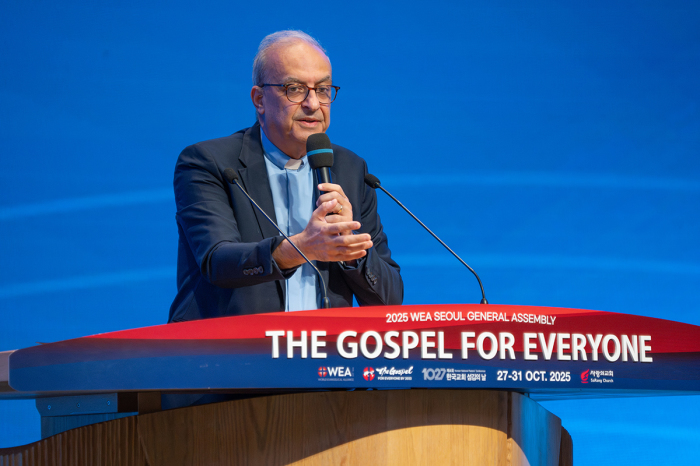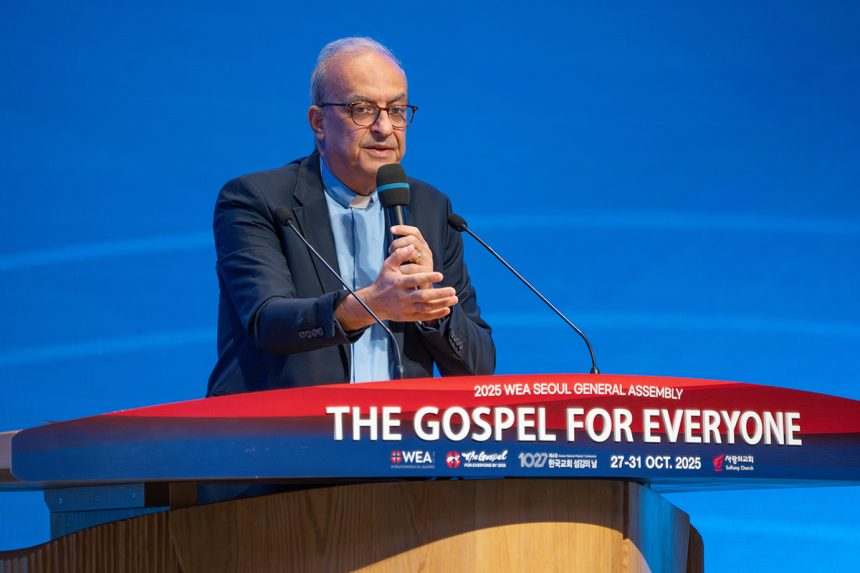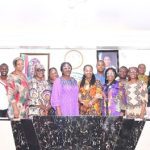
SEOUL, South Korea — The World Evangelical Alliance General Assembly concluded on Thursday evening after four days of discussion and deliberation about key issues affecting Evangelicalism and the task of fulfilling the Great Commission.
During the gathering, the Rev. Botrus Mansour was installed as the new secretary general of the WEA, ending a year-and-a-half vacancy in the top position. Hailing from Nazareth, Mansour brings a wealth of experience to the role as a former lawyer who has held various leadership positions across church and educational bodies in the Holy Land, including co-chairman of the Lausanne Initiative for Reconciliation Israel-Palestine.
Speaking to reporters, he said he was filling “large shoes” and that while his new appointment was “overwhelming,” he was “here to serve.”
In his first address as secretary general of the WEA on Thursday night, he said it was “special” to be appointed secretary general as a Palestinian Christian from Israel, and coming so soon after the ceasefire agreement reached with Hamas.
“I give tribute to my people and my country,” he said, adding that it was his prayer that the ceasefire will last.
He said he was “really humbled” to be elected as secretary general and felt a “big responsibility” for the organization which has 161 national alliances around the world, representing over 650 million Evangelicals.
“I’m here to serve,” he repeated, as he spoke of his desire to see a WEA marked by “teamwork” and “unity,” and the strengthening of regional alliances.
“We are different people but we have one spirit, we have one mission, one core of beliefs. Can we rise up to the level of Jesus’s prayer, ‘Let them be one as we are one’?” he said.
Later on in his address, Mansour said he wanted to “reclaim” the word ‘Evangelical’ and bring it back to its original meaning as “bears of good news.”
“It has been politicized and changed, and people use it in different ways … we want to be bearers of the Good News to the whole world. We will work for this task,” he said.
Mansour’s installation as secretary general was not the only significant change in the WEA’s leadership this week, with Godfrey Yogarajah of Sri Lanka being installed as the new chairman of its International Council.
It is the first time that both the secretary general and chairman of the WEA come from the global South. Yogarajah said this was “a reflection of what is happening globally,” given the “phenomenal” growth of Christianity across the global South.
He said he was “humbled and honored” to be elected chair, and that the International Council stood ready to serve the national alliances.
“I thank you for having placed your confidence in me,” he said.
The WEA General Assembly was hosted by the 60,000-member SaRang Church in the nation’s capital, and brought together over 850 Evangelicals from around the world.
The theme of the general assembly was “The Gospel for Everyone by 2033” and many of the sessions were dedicated to how this ambitious goal can become a reality with only eight years to go. In a letter of greeting to delegates of the general assembly, Mansour said the theme was “not simply a program or slogan, but a mandate rooted in Scripture and the heart of God for all people.”
On the last day of meetings, delegates were presented with the WEA’s Seoul Declaration, a 15-page document crafted by an international group of theologians including eight from South Korea. It offers Evangelical position statements on a range of issues, from gender and human sexuality, to war, abortion, religious freedom, and continued divisions on the Korean Peninsula.
A spokesperson for the WEA said the statement was intended to be a “guiding post” for members, with carefully considered theological perspectives on key issues in the world today and “how the Church ought to have direction for the future.”
“We meet at a pivotal moment in human history, marked by the aftershocks of a global pandemic, widespread economic uncertainty, intensifying conflicts across multiple regions, and the rapid emergence of artificial intelligence into the public sphere. The global Church has not been shielded from these pressures; many of our communities continue to endure hardship, suffering and deepening social fragmentation,” the introduction reads.
It continues: “Amidst this sobering backdrop, our assembly takes place in a land shaped by both profound Gospel fruitfulness and enduring division. The Korean Peninsula, divided for over eight decades, symbolizes both the pain of separation and the resilient hope of reconciliation. We acknowledge this unique context as we meet in fellowship with the Korean Churches — a community whose evangelical witness has contributed significantly to global mission, public life, and theological depth.”
A statement within the declaration on “the core of the evangelical faith” emphasizes evangelism through Gospel proclamation and discipleship as “our most important and primary mission.”
However, Evangelicals need to repent for falling short of their calling to be salt and light, and for the “fragmentation of the Body of Christ,” which the declaration said had “diminished public witness of God’s sovereignty over all areas of life and the suffering endured by our persecuted brothers and sisters around the world.”
It prays that Christian leaders would be “preserved from abuse of authority, moral failure, or the pull of secularization, and instead serve with the humility of Christ.”
In a section on the dignity of life, the declaration grieves the “collective failure” of Evangelicals to be “more active” in addressing systems that perpetuate racism, tribalism and caste systems, or discriminate against refugees, migrants, women and children “in different times and regions across the world.” It laments “our inability to uphold a clear Evangelical stance on abortion, medically assisted death, and the welfare of the aged.”
Evangelicals have “often neglected environmental duties” and haven’t done “enough” to address the “abuse of God’s creation,” it goes on.
Perhaps a nod to some criticism of the WEA’s interfaith relations, which drew protests from some Korean Christians outside the venue over the four days, the declaration insists that the WEA is committed to “collaboration without compromise” and “remaining alert to the dangers of religious pluralism and syncretism, while holding firm to the Gospel, biblical orthodoxy, and the Spirit’s renewing power for both personal and societal transformation.”
The declaration goes on to “acknowledge that many in our societies wrestle deeply with questions of identity, sexuality and belonging,” and commits Evangelicals to “listening with humility, walking with compassion, and ministering with biblical clarity and pastoral tenderness.”
“Therefore, we affirm that practicing homosexuality is sin (Romans 1:26-27), contrary to God’s design for human sexuality. But we proclaim this truth not with condemnation, but in love — offering hope, healing and freedom that is found in Christ alone (1 Corinthians 6:9-11),” it continues.
“We desire to be a Church that speaks truth while embodying grace, always remembering our own need for mercy (Titus 3:3-7).”
Elsewhere it affirms that humans are made “male and female, equal in dignity and worth,” and that marriage is a “sacred union” between one man and one woman.
Further on, the declaration rejects “the culture of death that devalues the weak, the elderly, the unborn” and affirms “the sacredness of life from conception to natural death.”
It expresses the WEA’s commitment to “boldly resisting all ideological systems that suppress freedom of faith and distort biblical anthropology, even as we boldly share the truth in love and proclaim Christ with compassion, humility and courage.”
The document grieves war, violence and persecution, as well as the advancement in many regions of laws and ideologies “with little regard for conscience or the sacred human dignity affirmed in the Holy Scripture.” In such a world, Evangelicals are called to work for reconciliation and peace, it says.
The declaration prays specifically for “mercy on North Korea” and “for the end of systemic human rights violations,” as well as the release of people “unjustly imprisoned,” but also expresses “growing concern over emerging and rising societal pressures that challenges open expression of Evangelical faith in many contexts” on the Korean Peninsula.
The declaration concludes with a number of calls, including the defense of religious freedom and “deepening Evangelical unity,” and the “pursuit of human-centered, ethical development in technology, including the discerning and redemptive use of media in a rapidly changing digital age.”
WEA members have a week to consider the declaration and provide feedback.
This article was originally published at Christian Today







